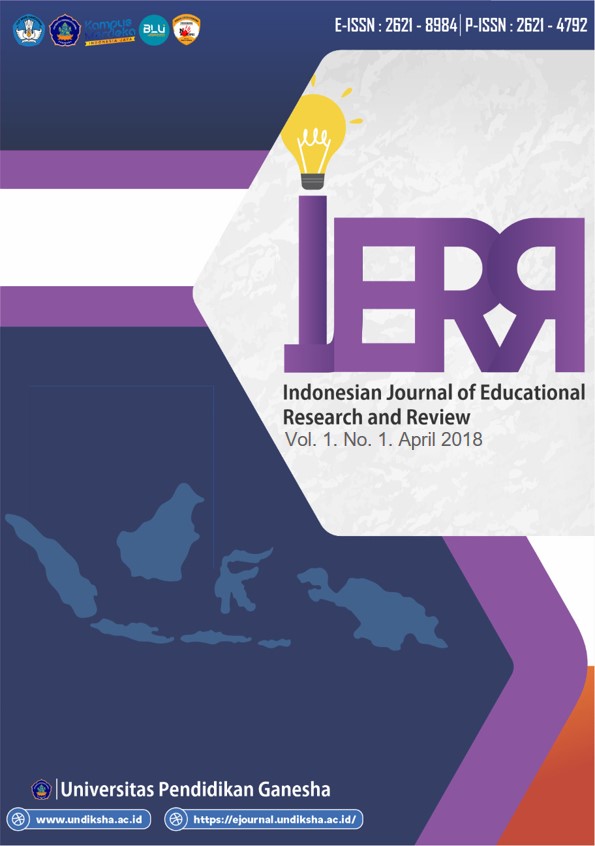PENGARUH MODEL PEMBELAJARAN KOOPERATIF TIPE PAIR CHECKS TERHADAP PENGUASAAN KOMPETENSI PENGETAHUAN IPS SISWA KELAS IV SD GUGUS II KUTA SELATAN TAHUN AJARAN 2017/2018
DOI:
https://doi.org/10.23887/ijerr.v1i1.14620Abstract
This study aimed to know the effect of cooperative learning type Pair Checks towards students’ mastery social science competence on the fourth grade students at SD Gugus II Kuta Selatan in academic year 2017/2018. The type of this research was quasi-experimental especially nonequivalent control group design. The population of this study was the fourth grade students at SD Gugus II Kuta Selatan in academic year 2017/2018 which consisted of 6 SD Negeri with 11 classes which consisted of 363 students. The sample of this study was done by using random sampling technique which was randomized to determine the experimental group and control group. In result, the fourth grade students of A class at SD No. 6 Benoa was the experimental group which consisted of 30 students and the fourth grade students of B class at SD No. 2 Tanjung Benoa was the control group which consisted of 34 students. Method of collecting data that was used in this study was multiple choice test. The data were analyzed by using descriptive and inferential statistical analysis. The result of data analysis showed that tcount = 5,594 and ttable = 2,000, at 5% significant level with dk = 62. This means that tcount = 5,594 > ttable = 2,000. The mean score mastery social science competence of students who were taught by cooperative learning type Pair Checks was higher, which was, 80.83 meanwhile the mean score of students who were taught by conventional learning was 70.62. In conclusion, it could be stated that cooperative learning type Pair Checks gave effect towards students’ social science competence on the fourth grade students at SD Gugus II Kuta Selatan in academic year 2017/2018.
References
Fathurrohman, Muhammad. 2016. Model-model Pembelajaran Inovatif Alternatif Desain Pembelajaran yang Menyenangkan. Yogyakarta: Ar-Ruzz Media.
Huda, Miftahul. 2013. Model-model Pengajaran dan Pembelajaran Isu-isu Metodis dan Paradigmatis. Yogyakarta: Pustaka Belajar.
Isjoni. 2013. Cooperatif Learning. Bandung: Alfabeta.
Kurniawan, Ade. 2017. “Pengaruh Model Pembelajaran Pair Check Terhadap Hasil Belajar PKn Siswa Kelas V SD N 1 Metro Timur”. Jurnal FKIP Universitas Lampung, Volume 6, Nomor 6 (hlm.23-24). (diakses pada tanggal 3 Januari 2018).
Peraturan Menteri Pendidikan dan Kebudayaan Republik Indonesia Nomor 57 Tahun 2014 tentang Kurikulum 2013 Sekolah Dasar/Madrasah Ibtidaiyah, 2014. Jakarta: Departemen Pendidikan dan Kebudayaan.
Sanjaya, Wina. 2015. Kurikulum dan Pembelajaran Teori dan Praktik Pengembangan Kurikulum Tingkat Satuan Pendidikan (KTSP). Jakarta: Pramedia Group
Shoimin, Aris. 2014. 68 Model Pembelajaran Inovatif dalam Kurikulum 2013. Yogyakarta: Ar-Ruzz Media.
Sugiyono, 2015. Metode Penelitian Pendidikan. Bandung: Alfabeta.
Sukardi, 2012. Metodologi Penelitian Pendidikan Kompetensi dan Praktiknya. Yogyakarta: Sinar Grafika Offset.
Sumaatmadja, Nursid. 2007. Konsep Dasar IPS. Jakarta: Universitas Terbuka.
Susanto, Ahmad. 2013. Teori Belajar & Pembelajaran di Sekolah Dasar. Jakarta: Prenadamedia Group.
Triwiyanto, Teguh. 2015. Manajemen Kurikulum dan Pembelajaran. Jakarta: Sinar Grafika Offset.
Utomo, Edy Setiyo. 2016. “Pengaruh Model Pembelajaran Kooperatif Tipe Pair Check Terhadap Hasil Belajar Siswa”. Jurnal Program Studi Pendidikan Matematika STKIP PGRI Jombang. (hlm.8-10). (diakses pada tanggal 4 Januari 2018).
Downloads
Published
How to Cite
Issue
Section
License
Authors who publish with the Indonesian Journal of Educational Research and Review (IJERR) agree to the following terms:
- Authors retain copyright and grant the journal the right of first publication with the work simultaneously licensed under a Creative Commons Attribution-ShareAlike 4.0 International License. that allows others to share the work with an acknowledgment of the work's authorship and initial publication in this journal.
- Authors are able to enter into separate, additional contractual arrangements for the non-exclusive distribution of the journal's published version of the work (e.g., post it to an institutional repository or publish it in a book), with an acknowledgment of its initial publication in this journal.
- Authors are permitted and encouraged to post their work online (e.g., in institutional repositories or on their website) prior to and during the submission process, as it can lead to productive exchanges, as well as earlier and greater citation of published work. (See The Effect of Open Access)









